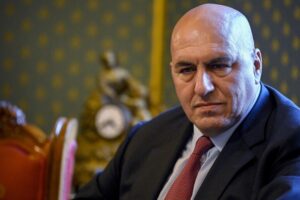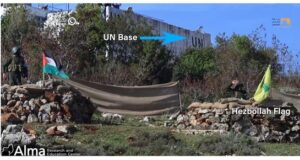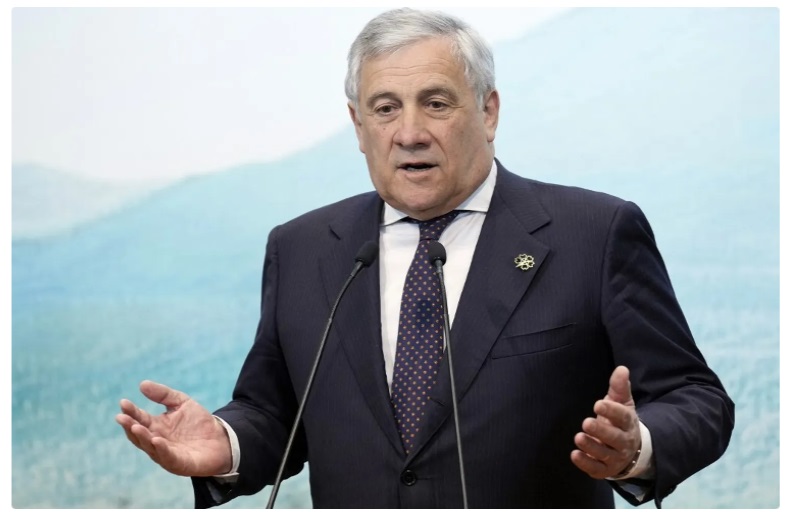By Giovanni Giacalone
The United Nations Interim Force in Lebanon (UNIFIL) said that four Ghanaian peacekeepers were wounded on Tuesday when a rocket that was most likely fired by “non-state actors” hit their base in southern Lebanon. Peacekeepers and facilities were targeted in three separate incidents, UNIFIL added. In addition, eight rockets hit the headquarters of the Italian contingent in Shama, southern Lebanon.
The Italian Defense Minister, Guido Crosetto, immediately blamed Israel for the attack, but a Defense Ministry source said that Crosetto “did not have the right information” when he spoke. “Hezbollah was responsible for the attack” the source told AFP. Not long after, the Italian Foreign Minister, Antonio Tajani, also corrected Crosetto, saying that the rockets were fired by Hezbollah.

Impulsiveness, bad coordination within and between Ministries? Maybe. But this is the least of the problems, because Minister Tajani went far beyond what was required to say, with a statement that raises big doubts and further questions, as reported by Adkronos News Agency:
“Judging by the type of rockets, we can confirm that it was Hezbollah that hit the Unifil base. Hezbollah has no right to touch the Italian troops, who have also guaranteed the safety of Hezbollah and it is therefore inadmissible and unacceptable that they shoot at the Italian contingent…If it was a mistake, they should learn to use weapons better”.
UNIFIL is currently under heavy criticism for its inability to implement the 1701 resolution, as recalled on October 15th by the Strategic Advisor to the U.S. Government, Edward Luttwak, who tweeted:
“I am sorry that the Prime Minister (Italian) defends UNIFIL, which was supposed to keep Hezbollah away from the Israeli border and never did anything while successive commanders were promoted. The Israelis found many assault bunkers a few meters from the UNIFIL positions”.
The situation is now serious. Wasn’t the UNIFIL mission supposed to implement resolution 1701? Which meant disarm Hezbollah, prevent it from firing at Israel and keep the terrorist organization away from the border with Israel?
In addition, what does “…learn to use their weapons better” mean? Use them against who? Hezbollah is not supposed to have, nor use, weapons and that’s why UNIFIL is there (at least in theory).
This is interesting, considering that on October 15th 2024, during a Senate audition, Italian Prime Minister Giorgia Meloni boasted that Italy was the strictest in blocking weapons sales to Israel:
“I would like to point out that the Italian position of the complete blocking of all new licenses is much more restrictive than that applied by our partners, France, Germany and the United Kingdom: these partners continue to operate also for new licenses on a case-by-case basis, we have blocked everything”.
Meloni stated that after the start of Israeli operations in Gaza, the Italian government suspended the shipment of any form of armament to Israel: all contracts signed after October 7, 2023 have not been applied. She also added that all contracts prior to that date were analyzed case by case by Uama (Unit for the authorization of armament materials), the competent authority at the Minister of Foreign affairs. The Italian PM added: “Where there is a risk that this material could be used in the current crisis, we will not proceed…This is how Italy is proceeding, and I believe it is a very serious way of proceeding”.
It’s a shame that the same “serious way of proceeding” does not seem to be applied to Hezbollah.
Going back to Tajani, in April 2024, during the TV show “Stasera Italia” on Rete 4 channel, following Iran’s first missile attack against Israel, Tajani had stated:
“The Iranians have assured us that our Italian soldiers in the area will be respected…The Italian contingent in Lebanon is under the aegis of the UN, it is in a condition to be protected, I don’t think there are any dangers either for the Italian soldiers or for the Italian citizens in Israel and Iran”. As for the Houthi attacks in the Red Sea, the minister explained how he was assured that “only ships that bring weapons to Israel would be attacked”. (Agi, Apr 14,2024).
This last statement is further interesting, since the European anti-Houthi mission “Aspides” in the Red Sea is led by Italy and Greece. Now, Israel can have a peaceful sleep knowing that the naval traffic towards Israel in the Red Sea is in good hands.
As to the Italian Defense Minister, Guido Crosetto, he is not new to inappropriate, impulsive and rabid reactions against Israel, way before ascertaining facts.
Shortly after the October 10th 2024 incident, when two Indonesian peacekeepers were slightly injured by Israeli fire, Crosetto immediately accused Israel by saying that the attacks “could constitute war crimes,” and asked for an explanation because “it was not a mistake.”
Crosetto described the “shooting” as “intolerable,” lodging protests with his Israeli counterpart and Israel’s ambassador to Italy. He also added: “My intention is to let spaces of peace prevail, not to let the idea pass that there could be a continuous war“. In addition, Crosetto stated that “Italy does not take orders from Israel”.
His statements caused a reply by the Israeli Embassy in Rome:
“Unfortunately, the terrorist organization Hezbollah has installed its military capabilities undisturbed near the UNIFIL bases. For some time now, Hezbollah has been attacking Israel by operating near these bases, shooting into Israeli territory and digging tunnels near the aforementioned bases to drag Israel into some provocation. Israel is forced to respond to these attacks, to protect its forces and the safety of its citizens. Israel reiterates that it is not interested in an escalation in Lebanon, but is obliged to protect its citizens in accordance with international law. As promised, Israel has opened an investigation into the latest cases and will transmit the results in a transparent manner to its counterpart in Italy. In this regard, the Israeli military attaché will meet the leaders of the Italian army today, to illustrate the details of the investigation. Israel acts transparently and in close cooperation with Italy and with the UNIFIL forces operating on the ground, and regrets any damage to the United Nations and forces not involved. Israel appreciates Italy’s efforts to prevent escalation in our areas and its contribution to UNIFIL. The international community must demand the disarmament and withdrawal of Hezbollah forces in accordance with UN resolution 1701”.
It is also worth recalling what Minister Crosetto, said back in September 2005, when he held the role of credit manager for Berlusconi’s Forza Italia party.
Crosetto had spoken about a plan hatched by “Jewish and American Freemasonry that was already at the gates” to get their hands on Italian banks after having ousted the pro-Catholic Bank of Italy Governor Antonio Fazio. The statement had led to a harsh condemnation from the then president of the Italian Jewish communities, Amos Luzzato, who cited a revival of the “ghosts of the Fascist 1930s”, as reported at the time by the Italian newspaper Corriere della Sera.

In conclusion, regarding the Italian/UNIFIL activity in Lebanon, it is worth quoting what Francesco Cossiga (prime minister of Italy from 1979 to 1980 and the president of Italy from 1985 to 1992) once said during a long interview with the Israeli newspaper Yediot Aharonot, as exposed by the website Focus on Israel in a 2008 article entitled “Cossiga to the Italian Jews: we sold you out”, an interview that did not find much space among the Italian media:
“Italy, he believes, is implementing a similar agreement with Hezbollah today. UNIFIL forces would be invited to move freely in southern Lebanon, without fear for their safety, in exchange for a closed eye and the possibility of rearming given to Hezbollah. “The Moro Agreement was never clearly explained to me, I only hypothesized its existence. In the case of Hezbollah I can affirm with certainty that there is an agreement between the parties,” Cossiga says with certainty, “If they come to question me, I will testify before the judges that these are state secrets, and I am not required to reveal my sources.”
In relation to all this, it is time to reconsider the whole UNIFIL mission and recall troops back, as Argentina just did, because it was not just a failure, but it enormously advantaged Hezbollah, which was able to rearm itself and attack Israel, all under the eyes of the UNIFIL contingent.

